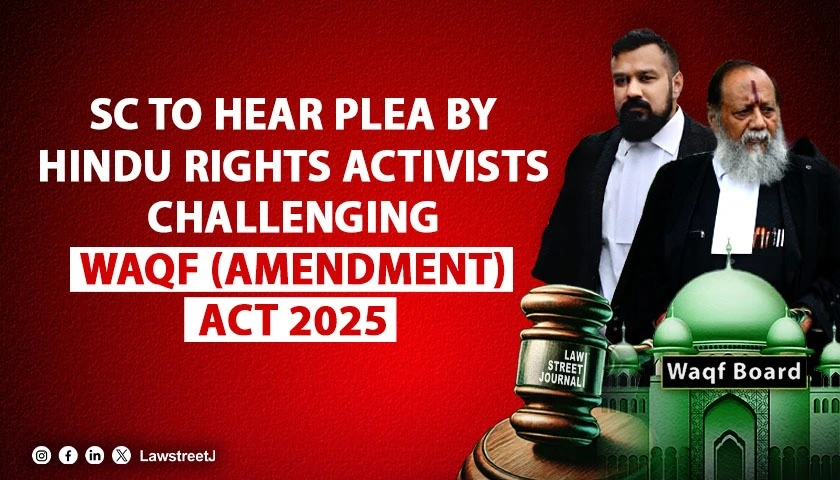New Delhi: In a major legal development, the Supreme Court of India on April 15 agreed to consider listing a fresh plea challenging the constitutional validity of several provisions of the Waqf (Amendment) Act, 2025. The bench, comprising Chief Justice Sanjiv Khanna and Justice Sanjay Kumar, took note of the submissions made by advocate Vishnu Shankar Jain that a new petition has been filed and sought its listing for hearing.
“All matters where mentioning slips are given, we give dates mostly within a week,” the Chief Justice remarked during the hearing.
The fresh plea, mentioned by advocate Vishnu Shankar Jain, was filed by Hari Shankar Jain—a noted Hindu rights activist and advocate—and Mani Munjal. The respondents named in the plea include the Union of India, the Ministry of Minority Affairs, and the Central Waqf Council.
This development comes just a day ahead of the scheduled hearing on April 16, where ten other petitions, including one filed by AIMIM leader Asaduddin Owaisi, are listed before a three-judge bench comprising the CJI, Justice Sanjay Kumar, and Justice K V Viswanathan.
The petitioners have invoked Article 32 of the Constitution of India, challenging the constitutional validity of Sections 3(r), 4, 6(1), 7(1), 8, 28, 29, 33, 36, 41, 52, 83, 85, 89, and 101 of the Waqf Act, asserting that these provisions violate Articles 14, 15, 21, 27, and 300A of the Constitution. The petitioners contend that these provisions allow for the unlawful appropriation of properties, which has resulted in substantial harm to the actual owners.
The petition further clarifies that the petitioners have no personal interest in the matter. They assert that their primary objective is to serve the public interest, particularly the large number of affected persons whose properties have been illegally seized by the Waqf Board under the current legislative framework.
The Prayer in the Petition:
1. Strike down unconstitutional provisions: Issue an appropriate writ, order, or direction striking down Sections 3(t), 4, 5, 6(1), 7(1), 8, 28, 29, 33, 36, 41, 52, 83, 85, 89, and 101 as ultra vires to Articles 14, 15, 21, 25, 27, and 300A of the Constitution.
2. Recovery of properties: Direct the Government of India to take effective steps to recover all Shamlat Deh, Shamlat Patti, and Jumla Mulkkan, or any other property entered in revenue records in identical names, which have been transferred or recorded in the name of the Waqf Board.
3. Non-applicability to non-Muslims: Declare that Hindus/non-Muslims cannot be affected by any action or order under Sections 4 and 5 of the Waqf Act and that they do not fall within the ambit of the phrase “any person aggrieved” in Sections 6(1) and 7(1).
4. Protection of Hindu religious properties: Declare that the appropriate Government must take steps to identify Hindu community religious/personal properties illegally registered as Waqf properties, particularly while exercising powers under Section 3C (added in 2025).
5. Restrict inspection powers of Waqf Boards: Declare that Waqf Boards cannot inspect records as provided under Sections 29/33 of the Waqf Act.
6. Role of District Magistrate: Declare that a District Magistrate, after providing an opportunity of hearing to the public, may direct registration of any property as Waqf property under Section 36, as amended in 2025.
7. Right to civil remedies: Declare that members of the Hindu/non-Islamic communities can approach Civil Courts against any action taken under the Waqf Act and that Sections 83/85 do not apply to them.
8. Unconstitutionality of Section 108: Declare that the provisions of Section 108, as they existed before the amendment, were unconstitutional and void ab initio.
9. Restoration of Evacuee Properties: Direct the Government of India to restore Evacuee Properties that were transferred to Waqf Boards under Section 108 of the Waqf Act, 1995.
10. Other appropriate reliefs: Pass any other writs, orders, or directions as may be deemed fit and proper in the interest of justice and to do complete justice.
The petition filed by Hari Shankar Jain and Mani Munjal, and mentioned by Vishnu Shankar Jain, brings renewed focus to the legal and constitutional scrutiny of the Waqf (Amendment) Act. The Supreme Court’s upcoming hearing is likely to have far-reaching implications for property rights, religious rights, and secular governance in India. With multiple petitions on the same issue now before the court, the matter is poised to become a landmark case in determining the balance between religious endowments and individual constitutional rights.















